英语专业泛读教程第四册课文翻译[宝典]
【刘乃银】英语泛读教程4第三版课文翻译

【刘乃银】英语泛读教程4第三版课文翻译英语泛读教程4 第三版主编:刘乃银Unit1天才与工匠许多人羡慕作家们的精彩小说,但却很少有人知道作家们是如何辛勤笔耕才使一篇小说问世的。
以下的短文将讨论小说的酝酿过程,以及作家是如何将这小说雕琢成一件精致完美的艺术品。
有一次,我在暮色中来到小树林边一棵鲜花盛开的小桃树前。
我久久站在那里凝视着,直到最后一道光线消逝。
我看不到那树原先的模样,看不见曾穿透果核,能崩碎你的牙齿的力量,也看不到那使它与橡树和绿草相区别的原则。
显现在我面前的,是一种深邃而神秘的魅力。
当读者读到一部杰出的小说时,他也会这样如痴如狂,欲将小说字字句句刻骨铭心,不提出任何问题。
但即使是个初学写作者也知道,除那将小说带到世上的文字之外,还有更多的构成小说生命的因素,小说的生命并不始于写作,而始于内心深处的构思。
要创作出有独创性的作品,并不要求懂得创造的功能。
多少世纪以来的艺术、哲学及科学创造都出自人们的头脑,而创造者也许从未想到去关注创造的内在过程。
然而,在我看来,对创造工作一定程度的了解,至少会使我们通过知道两个事实,增长我们处理正在出现的故事的智慧。
首先,天赋不是掌握了技艺的艺术家独有的特性,而是人脑的创造性功能。
不仅所有对技艺的掌握都含有天赋,而且每个人都具有天赋,无论他的天赋发展是何等不充分。
对技艺的掌握是天赋的显现,是经过培养的,发展了的和受过训练的天赋。
你的天赋在最原始的层面上起作用。
它的任务就是创造。
它是你的故事的创造者。
第二,将你的小说带进世界的文字是艺术家的工作,它就和一个泥瓦匠的工作一样,有意识、谨慎而实实在在。
天赋正如理解力、记忆力和想象力一样是我们的精神禀赋中的天然部分,而技艺却不是。
它必须通过实践才能学到,并要通过实践才能掌握。
如果要使在我们内心深处浮现的故事跃然纸上,光彩照人,那么,每个故事都须有感染力极强的优雅文笔。
只有健全的技艺才能使我们做到这一点。
一个故事是如何酝酿成的呢,据说,我们从一生中的前二十年,或许前五年起就开始写作。
英语泛读第四册Unit10翻译

墨尼黑再保险公司在其列出的索赔要求日益增加的五点原因,认为人口增长首当其冲,天气变化则列在第五。一些批评家也许会紧抓住这一点来 轻视天气正越变越糟的观点,但综合起来考虑,这是幅更可怕的画面。幸亏人口增长主要在城市和沿海地区,更多的“地球过客们”是在不适当的时间住在了不适当的地方。
当你阅读本文时,请把目光轻快地投向窗外。天空澄净,微风轻拂,日光明媚。也许并不是这样——这些日子, 大自然母亲充满着意想不到的事情。日历上说现在是春天,但窗外完全可能是一场冬季的暴风雪,一阵夏日的酷暑或一股秋天的寒流。几乎是在一瞬之间,气候就好象从一个季节转到了另一个季节。而且不管天气转向何方,它看起来变得越来越极端。
天气正越变越糟?
因为“这些日子大自然母亲充满着意想不到的事情”,看起来天气在越变越糟,越来越狂野。全球变暖是现在的热门话题,常常理所当然地被看成恶劣气候的罪魁祸首。但是,凯文?E?川伯斯这样的科学家在下定论时态度谨慎。请阅读以下文章,看一看厄尔尼诺和拉尼娜现象所起的作用。
As you read this, flip your eyes over to the window. The sky is clear, the wind light, and the sun brilliant. Or maybe not - Mother Nature is full of surprises these days. The calendar says it's spring, but there could just as easily be a winter blizzard, a summer swelter, or an autumn cold snap on the other side of that glass pane. Almost in an instant, it seems, the weather shifts from one season to another. And wherever it swings, it seems increasingly likely to be extreme.
英语泛读教程4文章翻译及答案 完整版
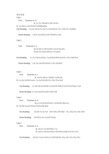
课文答案Unit 1Text: Exercises A. dB. 1.c 2.c 3.b 4.d 5.c 6.b 7.b 8.aD. 1.a 2.b 3.c 4.d 5.b 6.d 7.d 8.b9.a10.aFast Reading: 1.a 2.a 3.d 4.c 5.c 6.d 7.c 8.d 9.d 10.c 11.c 12.b 13.c 14.d15.aHome Reading: 1.d 2.c 3.a 4.d 5.c 6.d 7.b 8.b 9.c 10.aUnit 2Text: Exercises A. aB.1.b 2.b 3.c 4.b 5.d 6.b 7.a 8 .b 9.a 10.cD.1.b 2.a 3.a 4.a 5.b 6.a 7.c 8.d 9.cFast Reading: 1.a 2.c 3.d 4.a 5.b 6.c 7.a 8.d 9.d 10.b 11.d 12.c 13.c 14.d 15.bHome Reading: 1.d .2.a 3.d 4.d 5.b 6.d 7.c 8.c 9.d 10.dUnit 3Text: Exercises A. cB. 1.b 2.a 3.b 4.c 5.d 6.b 7.a 8.b 9.bD. 1.a 2.a 3.d 4.b 5.a 6.c 7.c 8.a 9.d 10.b 11.c 12.c 13.a 14.dFast Reading: 1.c 2.b 3.b 4.a 5.b 6.b 7.a 8.d 9.b 10.b 11.b 12.b 13.d 14.a 1 5.dHome Reading: 1.c 2.a 3.a 4.b 5.a 6.b 7.d 8.c 9.bUnit 4Text: Exercises A. bB.1.c 2.d 3.b 4.d 5.b 6.c 7.a 8.d 9.b 10.d 11.cD. 1.d 2.b 3.a 4.a 5.b 6.d 7.b 8.a 9.b 10.dFast Reading: 1.d 2.b 3.c 4.c 5.d 6.b 7.d 8.c 9.b 10.d 11.c 12.a 13.c 14.c 15.d Home Reading: 1.d 2.d 3.c 4.c 5.a 6.d 7.b 8.aUnit 5Text: Exercises A. aB. 1.b 2.c 3.a 4.d 5.b 6.c 7.aD. 1.d 2.c 3.d 4.a 5.b 6.a 7.b 8.d 9.a 10.d 11.b 12.c 13.aFast Reading: 1.b 2.c 3.a 4.c 5.d 6.a 7.c 8.b 9.d 10.c 11.a 12.c 13.c 14.c 15.cHome Reading: 1.c 2.b 3.a 4.d 5.a 6.d 7.b 8.c 9.c 10.aUnit 6Text: Exercises A. bB. 1.b 2.d 3.a 4.a 5.c 6.b 7.c 8.dD. 1.d 2.c 3.a 4.a 5.d 6.c 7.d 8.d 9.b 10.a 11.b 12.cFast Reading: 1.c 2.a 3.d 4.b 5.a 6.b 7.c 8.d 9.a 10.b 11.b 12.d 13.a 14.c 15.cHome Reading: 1.c 2.a 3.b 4.d 5.b 6.a 7.c 8.a 9.c 10.bUnit 7Text: Exercises A. cB. 1.c 2.a 3.a 4.b 5.d 6.a 7.b 8.cD. 1.a 2.d 3.c 4.d 5.a 6.a 7.b 8.b 9.c 10.d 11.a 12.b 13.cFast Reading: 1.a 2.d 3.c 4.b 5.a 6.d 7.b 8.d 9.c 10.b 11.d 12.b 13.b 14.c 15.dHome Reading: 1.d 2.d 3.b 4.d 5.c 6.a 7.b 8.a 9.b 10.cUnit 8Text: Exercises c.B. 1.d 2. c 3.b 4.b 5 a. 6. c 7.a 8.cD. 1. c2.d 3.a 4. c 5. a 6. b 7. d 8. c 9. b 10.b 11.d 12.d 13.d 14.c 15.dFast Reading: 1.a 2.c 3. a 4. a 5. d 6. b 7c . 8. d 9. d 10. c 11.d 12. d 13. d 14.c 15.d Home Reading: 1.a 2. d 3. d 4.d 5.b 6.c 7.d 8. bUnit 9Text: Exercises A. bB. 1.b 2.a 3.d 4.c 5.d 6.a 7.b 8.cD. 1.a 2.c 3.b 4.a 5.c 6.d 7.a 8.b 9.c 10.a 11.c 12.a 13.b 14.c 15.a 16.c17.d 18.b 19.aFast Reading: 1.a 2.ac3.c 4.d 5.b 6.a 7.b 8.c 9.c 10.d 11.c 12.b 13.c 14.a 15.dHome Reading: 1.b 2.c 3.d 4.a 5.c 6.b 7.d 8.a 9.d 10.dUnit 10Text: Exercises A. cB. 1.c 2.b 3.b 4.c 5.b 6.c 7.b 8.b 9.c 10.cD. 1.b 2.a 3.c 4.b 5.a 6.d 7.d 8.a 9.c 10.a 11.c 12.b 13.b 14.aFast Reading: 1.a 2.b 3.b 4.d 5.a 6.c 7.b 8.b 9.d 10.a 11.d 12.c 13.d 14.d 15.bHome Reading: 1.c2.c 3.c4.a 5.d 6.b 7.d 8.d 9.b 10.cUnit 11Text: Exercises A. bB. 1.b 2.a 3.a 4.c 5.d 6.c 7.b 8.cD. 1.d 2.a 3.a 4.d 5.b 6.c 7.b 8.a 9.c 10.aFast Reading: 1.c 2.a 3.b 4.d 5.d 6.a 7.c 8.c 9.d 10.a 11.c 12.c 13.d 14.d 15.bHome Reading: 1.c 2.a 3.c 4.a 5.d 6.b 7.a 8.b 9.a 10.cUnit 12Text: Excises A. bB. 1.d 2.a 3.b 4.d 5.d 6.b 7.c 8.d 9.cD. 1.b 2.a 3.a 4.b 5.b 6.c 7.a 8.b 9.c 10.b 11.b 12.a 13.c 14.b 15.aFast Reading: 1.d 2.d 3.b 4.b 5.b 6.d 7.d 8.c 9.b 10.c 11.c 12.b 13.c 14.d 15.aHome Reading: 1.d 2.c 3.c 4.b 5.d 6.b 7.cUnit 13Text: Exercises bB. 1.a 2.b3.b 4.d5.c 6.a 7. c 8.c 9.cD. 1.a 2.b 3.b 4.a 5.b 6.d 7.a 8.c 9. c10.c 11. d 12. b 13.d 14.aFast Reading: 1.d 2.a 3.d 4.d5.d 6.c 7.b 8.c 9.a 10.a 11.c 12.b 13.b 14.d 15.dHome Reading: 1.b 2.c 3.d 4.c 5.c 6.b 7.cd 8.a d.a 10.b 11.dUnit 14Text: Exercises cB. 1c. 2.d 3.b 4.b 5.d 6.d 7.c 8.d 9.d 10.dD. 1.c. 2.d 3.b 4.a 5. d 6.d 7.a 8. a 9.b 10.a 11.c 12.a 13.a 14.d Fast Reading: 1.a 2.c 3.b 4. a 5.d 6.d 7. d 8.b 9.c 10. c 11.d 12.b 13.c 14. d15.bHome Reading: 1. c2. c 3. c 4. a 5.a 6. c 7.c 8.dUnit 15Text: Exercises A. bB. 1.a 2.d 3.c 4.c 5.a 6.c 7.d 8.b 9.bD. 1.a 2.b 3.c 4.c 5.a 6.b 7.a 8.a 9.d 10.bFast Reading: 1.a 2.c 3.d 4.b 5.a 6.b 7.c 8.c 9.d 10.c 11.c 12.b 13.a 14.d 15.dHome Reading: 1.a 2.c 3.d 4.b 5.c 6.d 7.d 8.b 9.课后翻译Unit 1Text天才与工匠许多人羡慕作家们的精彩小说,但却很少有人知道作家们是如何辛勤笔耕才使一篇小说问世的。
英语泛读教程4第三版翻译
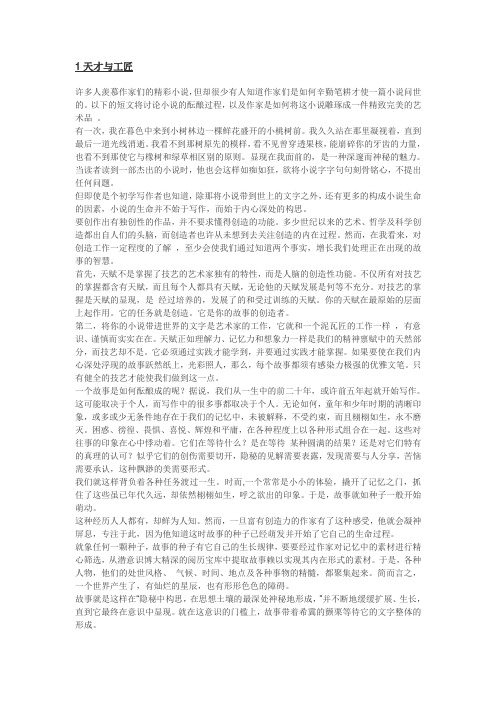
1天才与工匠许多人羡慕作家们的精彩小说,但却很少有人知道作家们是如何辛勤笔耕才使一篇小说问世的。
以下的短文将讨论小说的酝酿过程,以及作家是如何将这小说雕琢成一件精致完美的艺术品。
有一次,我在暮色中来到小树林边一棵鲜花盛开的小桃树前。
我久久站在那里凝视着,直到最后一道光线消逝。
我看不到那树原先的模样,看不见曾穿透果核,能崩碎你的牙齿的力量,也看不到那使它与橡树和绿草相区别的原则。
显现在我面前的,是一种深邃而神秘的魅力。
当读者读到一部杰出的小说时,他也会这样如痴如狂,欲将小说字字句句刻骨铭心,不提出任何问题。
但即使是个初学写作者也知道,除那将小说带到世上的文字之外,还有更多的构成小说生命的因素,小说的生命并不始于写作,而始于内心深处的构思。
要创作出有独创性的作品,并不要求懂得创造的功能。
多少世纪以来的艺术、哲学及科学创造都出自人们的头脑,而创造者也许从未想到去关注创造的内在过程。
然而,在我看来,对创造工作一定程度的了解,至少会使我们通过知道两个事实,增长我们处理正在出现的故事的智慧。
首先,天赋不是掌握了技艺的艺术家独有的特性,而是人脑的创造性功能。
不仅所有对技艺的掌握都含有天赋,而且每个人都具有天赋,无论他的天赋发展是何等不充分。
对技艺的掌握是天赋的显现,是经过培养的,发展了的和受过训练的天赋。
你的天赋在最原始的层面上起作用。
它的任务就是创造。
它是你的故事的创造者。
第二,将你的小说带进世界的文字是艺术家的工作,它就和一个泥瓦匠的工作一样,有意识、谨慎而实实在在。
天赋正如理解力、记忆力和想象力一样是我们的精神禀赋中的天然部分,而技艺却不是。
它必须通过实践才能学到,并要通过实践才能掌握。
如果要使在我们内心深处浮现的故事跃然纸上,光彩照人,那么,每个故事都须有感染力极强的优雅文笔。
只有健全的技艺才能使我们做到这一点。
一个故事是如何酝酿成的呢?据说,我们从一生中的前二十年,或许前五年起就开始写作。
这可能取决于个人,而写作中的很多事都取决于个人。
大学英语泛读教程第四册全文翻译
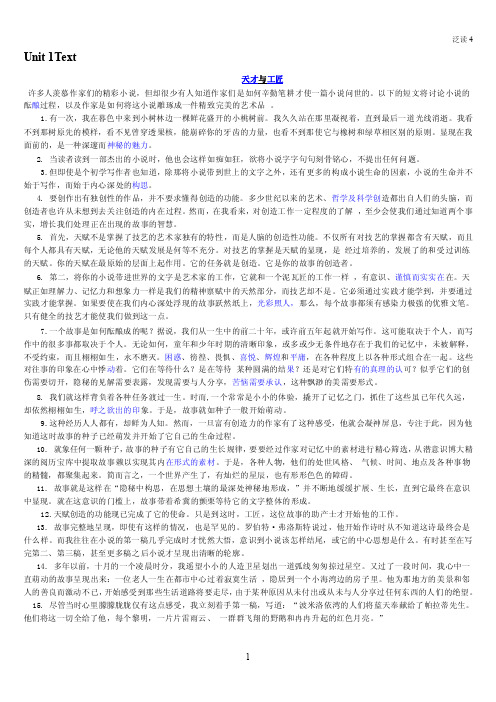
Unit 1Text天才与工匠许多人羡慕作家们的精彩小说,但却很少有人知道作家们是如何辛勤笔耕才使一篇小说问世的。
以下的短文将讨论小说的酝酿过程,以及作家是如何将这小说雕琢成一件精致完美的艺术品。
1.有一次,我在暮色中来到小树林边一棵鲜花盛开的小桃树前。
我久久站在那里凝视着,直到最后一道光线消逝。
我看不到那树原先的模样,看不见曾穿透果核,能崩碎你的牙齿的力量,也看不到那使它与橡树和绿草相区别的原则。
显现在我面前的,是一种深邃而神秘的魅力。
2. 当读者读到一部杰出的小说时,他也会这样如痴如狂,欲将小说字字句句刻骨铭心,不提出任何问题。
3.但即使是个初学写作者也知道,除那将小说带到世上的文字之外,还有更多的构成小说生命的因素,小说的生命并不始于写作,而始于内心深处的构思。
4. 要创作出有独创性的作品,并不要求懂得创造的功能。
多少世纪以来的艺术、哲学及科学创造都出自人们的头脑,而创造者也许从未想到去关注创造的内在过程。
然而,在我看来,对创造工作一定程度的了解,至少会使我们通过知道两个事实,增长我们处理正在出现的故事的智慧。
5. 首先,天赋不是掌握了技艺的艺术家独有的特性,而是人脑的创造性功能。
不仅所有对技艺的掌握都含有天赋,而且每个人都具有天赋,无论他的天赋发展是何等不充分。
对技艺的掌握是天赋的显现,是经过培养的,发展了的和受过训练的天赋。
你的天赋在最原始的层面上起作用。
它的任务就是创造。
它是你的故事的创造者。
6. 第二,将你的小说带进世界的文字是艺术家的工作,它就和一个泥瓦匠的工作一样,有意识、谨慎而实实在在。
天赋正如理解力、记忆力和想象力一样是我们的精神禀赋中的天然部分,而技艺却不是。
它必须通过实践才能学到,并要通过实践才能掌握。
如果要使在我们内心深处浮现的故事跃然纸上,光彩照人,那么,每个故事都须有感染力极强的优雅文笔。
英语专业泛读教程第四册课文翻译UNIT1-UNIT10
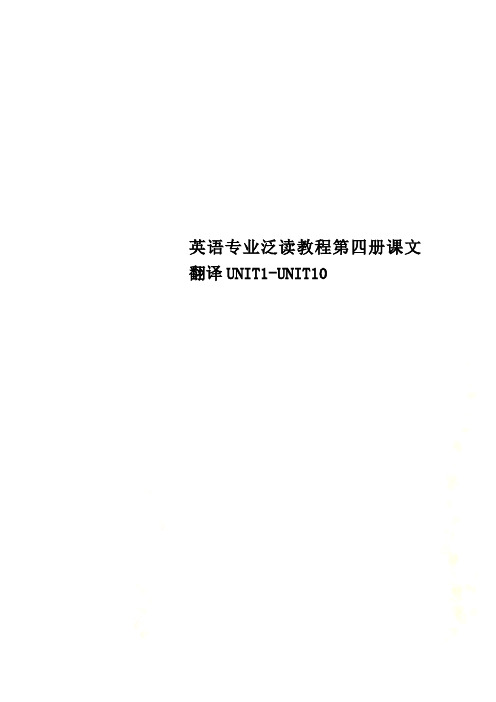
英语专业泛读教程第四册课文翻译UNIT1-UNIT10英语专业泛读教程第四册课文翻译(unit1-10)一、天才与工匠许多人羡慕作家们的精彩小说,但却很少有人知道作家们是如何辛勤笔耕才使一篇小说问世的。
以下的短文将讨论小说的酝酿过程,以及作家是如何将这小说雕琢成一件精致完美的艺术品。
有一次,我在暮色中来到小树林边一棵鲜花盛开的小桃树前。
我久久站在那里凝视着,直到最后一道光线消逝。
我看不到那树原先的模样,看不见曾穿透果核,能崩碎你的牙齿的力量,也看不到那使它与橡树和绿草相区别的原则。
显现在我面前的,是一种深邃而神秘的魅力。
当读者读到一部杰出的小说时,他也会这样如痴如狂,欲将小说字字句句刻骨铭心,不提出任何问题。
但即使是个初学写作者也知道,除那将小说带到世上的文字之外,还有更多的构成小说生命的因素,小说的生命并不始于写作,而始于内心深处的构思。
要创作出有独创性的作品,并不要求懂得创造的功能。
多少世纪以来的艺术、哲学及科学创造都出自人们的头脑,而创造者也许从未想到去关注创造的内在过程。
然而,在我看来,对创造工作一定程度的了解,至少会使我们通过知道两个事实,增长我们处理正在出现的故事的智慧。
首先,天赋不是掌握了技艺的艺术家独有的特性,而是人脑的创造性功能。
不仅所有对技艺的掌握都含有天赋,而且每个人都具有天赋,无论他的天赋发展是何等不充分。
对技艺的掌握是天赋的显现,是经过培养的,发展了的和受过训练的天赋。
你的天赋在最原始的层面上起作用。
它的任务就是创造。
它是你的故事的创造者。
第二,将你的小说带进世界的文字是艺术家的工作,它就和一个泥瓦匠的工作一样,有意识、谨慎而实实在在。
天赋正如理解力、记忆力和想象力一样是我们的精神禀赋中的天然部分,而技艺却不是。
它必须通过实践才能学到,并要通过实践才能掌握。
如果要使在我们内心深处浮现的故事跃然纸上,光彩照人,那么,每个故事都须有感染力极强的优雅文笔。
只有健全的技艺才能使我们做到这一点。
泛读英语第四册unit2课文及翻译
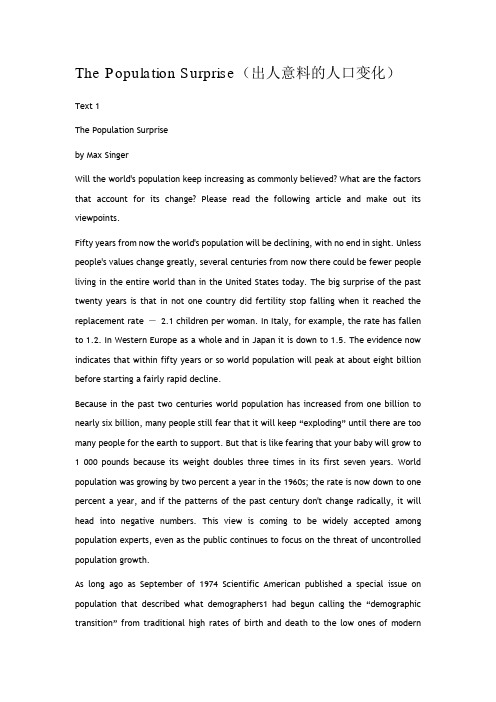
The Population Surprise(出人意料的人口变化)Text 1The Population Surpriseby Max SingerWill the world's population keep increasing as commonly believed? What are the factors that account for its change? Please read the following article and make out its viewpoints.Fifty years from now the world's population will be declining, with no end in sight. Unless people's values change greatly, several centuries from now there could be fewer people living in the entire world than in the United States today. The big surprise of the past twenty years is that in not one country did fertility stop falling when it reached the replacement rate -2.1 children per woman. In Italy, for example, the rate has fallen to 1.2. In Western Europe as a whole and in Japan it is down to 1.5. The evidence now indicates that within fifty years or so world population will peak at about eight billion before starting a fairly rapid decline.Because in the past two centuries world population has increased from one billion to nearly six billion, many people still fear that it will keep “exploding” until there are too many people for the earth to support. But that is like fearing that your baby will grow to 1 000 pounds because its weight doubles three times in its first seven years. World population was growing by two percent a year in the 1960s; the rate is now down to one percent a year, and if the patterns of the past century don't change radically, it will head into negative numbers. This view is coming to be widely accepted among population experts, even as the public continues to focus on the threat of uncontrolled population growth.As long ago as September of 1974 Scientific American published a special issue on population that described what demographers1 had begun calling the “demographic transition” from traditional high rates of birth and death to the low ones of modernsociety. The experts believed that birth and death rates would be more or less equal in the future, as they had been in the past, keeping total population stable after a level of 10-12 billion people was reached during the transition.Developments over the past twenty years show that the experts were right in thinking that population won't keep going up forever. They were wrong in thinking that after it stops going up, it will stay level. The experts' assumption that population would stabilize because birth rates would stop falling once they matched the new low death rates has not been borne out by experience. Evidence from more than fifty countries demonstrates what should be unsurprising: in a modern society the death rate doesn't determine the birth rate. If in the long run birth rates worldwide do not conveniently match death rates, then population must either rise or fall, depending on whether birth or death rates are higher. Which can we expect?The rapid increase in population during the past two centuries has been the result of lower death rates, which have produced an increase in worldwide life expectancy2 from about thirty to about sixty-two. (Since the maximum -if we do not change fundamental human physiology -is about eighty-five, the world has already gone three fifths as far as it can in increasing life expectancy.) For a while the result was a young population with more mothers in each generation, and fewer deaths than births. But even during this population explosion the average number of children born to each woman -the fertility rate -has been falling in modernizing societies. The prediction that world population will soon begin to decline is based on almost universal human behavior. In the United States fertility has been falling for 200 years (except for the blip of the Baby Boom3), but partly because of immigration it has stayed only slightly below replacement level for twenty-five years.Obviously, if for many generations the birth rate averages fewer than 2.1 children per woman, population must eventually stop growing. Recently the United Nations Population Division estimated that 44 percent of the world's people live in countries where the fertility rate has already fallen below the replacement rate, and fertility is falling fast almost everywhere else. In Sweden and Italy fertility has been belowreplacement level for so long that the population has become old enough to have more deaths than births. Declines in fertility will eventually increase the average age in the world, and will cause a decline in world population forty to fifty years from now. Because in a modern society the death rate and the fertility rate are largely independent of each other, world population need not be stable. World population can be stable only if fertility rates around the world average out to 2.1 children per woman. But why should they average 2.1, rather than 2.4, or 1.8, or some other number? If there is nothing to keep each country exactly at 2.1, then there is nothing to ensure that the overall average will be exactly 2.1.The point is that the number of children born depends on families' choices about how many children they want to raise. And when a family is deciding whether to have another child, it is usually thinking about things other than the national or the world population. Who would know or care if world population were to drop from, say, 5.85 billion to 5.81 billion? Population change is too slow and remote for people to feel in their lives -even if the total population were to double or halve in only a century. Whether world population is increasing or decreasing doesn't necessarily affect the decisions that determine whether it will increase or decrease in the future. As the systems people would say, there is no feedback loop.What does affect fertility is modernity. In almost every country where people have moved from traditional ways of life to modern ones, they are choosing to have too few children to replace themselves. This is true in Western and in Eastern countries, in Catholic and in secular societies. And it is true in the richest parts of the richest countries. The only exceptions seem to be some small religious communities. We can't be sure what will happen in Muslim countries4, because few of them have become modern yet, but so far it looks as if their fertility rates will respond to modernity as others' have.Nobody can say whether world population will ever dwindle to very low numbers; that depends on what values people hold in the future. After the approaching peak, as long as people continue to prefer saving effort and money by having fewer children, populationwill continue to decline. (This does not imply that the decision to have fewer children is selfish; it may, for example, be motivated by a desire to do more for each child.) Some people may have values significantly different from those of the rest of the world, and therefore different fertility rates. If such people live in a particular country or population group, their values can produce marked changes in the size of that country or group, even as world population changes only slowly. For example, the U.S. population, because of immigration and a fertility rate that is only slightly below replacement level, is likely to grow from 4.5 percent of the world today to 10 percent of a smaller world over the next two or three centuries. Much bigger changes in share are possible for smaller groups if they can maintain their difference from the average for a long period of time. (To illustrate: Korea's population could grow from one percent of the world to 10 percent in a single lifetime if it were to increase by two percent a year while the rest of the world population declined by one percent a year.)World population won't stop declining until human values change. But human values may well change -values, not biological imperatives, are the unfathomable variable in population predictions. It is quite possible that in a century or two or three, when just about the whole world is at least as modern as Western Europe is today, people will start to value children more highly than they do now in modern societies. If they do, and fertility rates start to climb, fertility is no more likely to stop climbing at an average rate of 2.1 children per woman than it was to stop falling at 2.1 on the way down.In only the past twenty years or so world fertility has dropped by 1.5 births per woman. Such a degree of change, were it to occur again, would be enough to turn a long-term increase in world population of one percent a year into a long-term decrease of one percent a year. Presumably fertility could someday increase just as quickly as it has declined in recent decades, although such a rapid change will be less likely once the world has completed the transition to modernity. If fertility rises only to 2.8, just 33 percent over the replacement rate, world population will eventually grow by one percent a year again -doubling in seventy years and multiplying by twenty in only three centuries.The decline in fertility that began in some countries, including the United States, in the past century is taking a long time to reduce world population because when it started, fertility was very much higher than replacement level. In addition, because a preference for fewer children is associated with modern societies, in which high living standards make time valuable and children financially unproductive and expensive to care for and educate, the trend toward lower fertility couldn't spread throughout the world until economic development had spread. But once the whole world has become modern, with fertility everywhere in the neighborhood of replacement level, new social values might spread worldwide in a few decades. Fashions in families might keep changing, so that world fertility bounced above and below replacement rate. If each bounce took only a few decades or generations, world population would stay within a reasonable narrow range -although probably with a long-term trend in one direction or the other.The values that influence decisions about having children seem, however, to change slowly and to be very widespread. If the average fertility rate were to take a long time to move from well below to well above replacement rate and back again, trends in world population could go a long way before they reversed themselves. The result would be big swings in world population -perhaps down to one or two billion and then up to 20 to 40 billion.Whether population swings are short and narrow or long and wide, the average level of world population after several cycles will probably have either an upward or a downward trend overall. Just as averaging across the globe need not result in exactly 2.1 children per woman, averaging across the centuries need not result in zero growth rather than a slowly increasing or slowly decreasing world population. But the long-term trend is less important than the effects of the peaks and troughs5 . The troughs could be so low that human beings become fewer than they were in ancient times. The peaks might cause harm from some kinds of shortages.One implication is that not even very large losses from disease or war can affect the world population in the long run nearly as much as changes in human values do. What we have learned from the dramatic changes of the past few centuries is that regardless ofthe size of the world population at any time, people's personal decisions about how many children they want can make the world population go anywhere -to zero or to 100 billion or more.(1916words)课文一出人意料的人口变化马克斯·辛格世界人口会象人们通常认为的那样持续增长吗?造成人口变化的因素是什么?请阅读下面的文章,并弄清其观点。
大英四泛读翻译大英4泛读翻译Book4
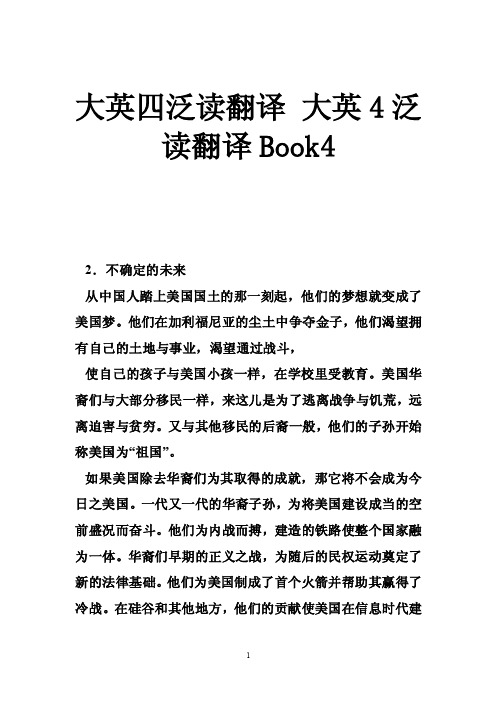
大英四泛读翻译大英4泛读翻译Book42.不确定的未来从中国人踏上美国国土的那一刻起,他们的梦想就变成了美国梦。
他们在加利福尼亚的尘土中争夺金子,他们渴望拥有自己的土地与事业,渴望通过战斗,使自己的孩子与美国小孩一样,在学校里受教育。
美国华裔们与大部分移民一样,来这儿是为了逃离战争与饥荒,远离迫害与贫穷。
又与其他移民的后裔一般,他们的子孙开始称美国为“祖国”。
如果美国除去华裔们为其取得的成就,那它将不会成为今日之美国。
一代又一代的华裔子孙,为将美国建设成当的空前盛况而奋斗。
他们为内战而搏,建造的铁路使整个国家融为一体。
华裔们早期的正义之战,为随后的民权运动奠定了新的法律基础。
他们为美国制成了首个火箭并帮助其赢得了冷战。
在硅谷和其他地方,他们的贡献使美国在信息时代建立并保持其优势地位。
今天这些华裔分散在每个我们可想象的行业中:有投资者,教师,作者,医生,工程师,律师,首席执行官,社会工作者,会计,建筑师,警察,消防员,演员和宇航员。
可悲的是,尽管这么长时间的贡献,许多华裔在美国仍然被当成外国人。
大部分新移民者将会遭遇这样的嘲笑:“从哪儿来回哪儿去吧!”就像有人说的,美国华裔们就像客人一样呆在其他人屋子里,不能将脚放在桌子上,不能得到真正的放松。
中式口音与文化传统可能会消失,但我们的皮肤颜色与眼睛形状却无法改变。
这些特性让一些人理所当然地将美国华人视为异类,自然也就称不上是纯正的美国人了。
美国大众媒体把美国华人模式化,把他们描绘成与生俱来就与美国人不同,无法改变。
因而美国华人的美国化被这种轻而易举但带有欺骗性的模式化蒙上了阴影。
用人类的观点来看,什么是造成这种不和的因素呢?一个在加利福尼亚洲,西柯汶纳的本地委员会成员,有人在电话里对他说:“哇,你完全就像一个真正的美国人,一点儿都没有中式口音。
”医学电视剧中美籍华人医生不多,事实上,美国每六个医生中就有一个是亚裔美国人。
1999年6月,刘云平出生于俄亥俄州,在加利福尼亚读大学,在华盛顿邮报上介绍了他做美国空军上尉时的一个小故事:“你是中国空军吗?”旁边一位穿着得体的女士问道。
英语泛读教程4文章翻译及答案 完整版

课文答案Unit 1Text: Exercises A. dB. 1.c 2.c 3.b 4.d 5.c 6.b 7.b 8.aD. 1.a 2.b 3.c 4.d 5.b 6.d 7.d 8.b9.a10.aFast Reading: 1.a 2.a 3.d 4.c 5.c 6.d 7.c 8.d 9.d 10.c 11.c 12.b 13.c 14.d15.aHome Reading: 1.d 2.c 3.a 4.d 5.c 6.d 7.b 8.b 9.c 10.aUnit 2Text: Exercises A. aB.1.b 2.b 3.c 4.b 5.d 6.b 7.a 8 .b 9.a 10.cD.1.b 2.a 3.a 4.a 5.b 6.a 7.c 8.d 9.cFast Reading: 1.a 2.c 3.d 4.a 5.b 6.c 7.a 8.d 9.d 10.b 11.d 12.c 13.c 14.d 15.bHome Reading: 1.d .2.a 3.d 4.d 5.b 6.d 7.c 8.c 9.d 10.dUnit 3Text: Exercises A. cB. 1.b 2.a 3.b 4.c 5.d 6.b 7.a 8.b 9.bD. 1.a 2.a 3.d 4.b 5.a 6.c 7.c 8.a 9.d 10.b 11.c 12.c 13.a 14.dFast Reading: 1.c 2.b 3.b 4.a 5.b 6.b 7.a 8.d 9.b 10.b 11.b 12.b 13.d 14.a 1 5.dHome Reading: 1.c 2.a 3.a 4.b 5.a 6.b 7.d 8.c 9.bUnit 4Text: Exercises A. bB.1.c 2.d 3.b 4.d 5.b 6.c 7.a 8.d 9.b 10.d 11.cD. 1.d 2.b 3.a 4.a 5.b 6.d 7.b 8.a 9.b 10.dFast Reading: 1.d 2.b 3.c 4.c 5.d 6.b 7.d 8.c 9.b 10.d 11.c 12.a 13.c 14.c 15.d Home Reading: 1.d 2.d 3.c 4.c 5.a 6.d 7.b 8.aUnit 5Text: Exercises A. aB. 1.b 2.c 3.a 4.d 5.b 6.c 7.aD. 1.d 2.c 3.d 4.a 5.b 6.a 7.b 8.d 9.a 10.d 11.b 12.c 13.aFast Reading: 1.b 2.c 3.a 4.c 5.d 6.a 7.c 8.b 9.d 10.c 11.a 12.c 13.c 14.c 15.cHome Reading: 1.c 2.b 3.a 4.d 5.a 6.d 7.b 8.c 9.c 10.aUnit 6Text: Exercises A. bB. 1.b 2.d 3.a 4.a 5.c 6.b 7.c 8.dD. 1.d 2.c 3.a 4.a 5.d 6.c 7.d 8.d 9.b 10.a 11.b 12.cFast Reading: 1.c 2.a 3.d 4.b 5.a 6.b 7.c 8.d 9.a 10.b 11.b 12.d 13.a 14.c 15.cHome Reading: 1.c 2.a 3.b 4.d 5.b 6.a 7.c 8.a 9.c 10.bUnit 7Text: Exercises A. cB. 1.c 2.a 3.a 4.b 5.d 6.a 7.b 8.cD. 1.a 2.d 3.c 4.d 5.a 6.a 7.b 8.b 9.c 10.d 11.a 12.b 13.cFast Reading: 1.a 2.d 3.c 4.b 5.a 6.d 7.b 8.d 9.c 10.b 11.d 12.b 13.b 14.c 15.dHome Reading: 1.d 2.d 3.b 4.d 5.c 6.a 7.b 8.a 9.b 10.cUnit 8Text: Exercises c.B. 1.d 2. c 3.b 4.b 5 a. 6. c 7.a 8.cD. 1. c2.d 3.a 4. c 5. a 6. b 7. d 8. c 9. b 10.b 11.d 12.d 13.d 14.c 15.dFast Reading: 1.a 2.c 3. a 4. a 5. d 6. b 7c . 8. d 9. d 10. c 11.d 12. d 13. d 14.c 15.d Home Reading: 1.a 2. d 3. d 4.d 5.b 6.c 7.d 8. bUnit 9Text: Exercises A. bB. 1.b 2.a 3.d 4.c 5.d 6.a 7.b 8.cD. 1.a 2.c 3.b 4.a 5.c 6.d 7.a 8.b 9.c 10.a 11.c 12.a 13.b 14.c 15.a 16.c17.d 18.b 19.aFast Reading: 1.a 2.ac3.c 4.d 5.b 6.a 7.b 8.c 9.c 10.d 11.c 12.b 13.c 14.a 15.dHome Reading: 1.b 2.c 3.d 4.a 5.c 6.b 7.d 8.a 9.d 10.dUnit 10Text: Exercises A. cB. 1.c 2.b 3.b 4.c 5.b 6.c 7.b 8.b 9.c 10.cD. 1.b 2.a 3.c 4.b 5.a 6.d 7.d 8.a 9.c 10.a 11.c 12.b 13.b 14.aFast Reading: 1.a 2.b 3.b 4.d 5.a 6.c 7.b 8.b 9.d 10.a 11.d 12.c 13.d 14.d 15.bHome Reading: 1.c2.c 3.c4.a 5.d 6.b 7.d 8.d 9.b 10.cUnit 11Text: Exercises A. bB. 1.b 2.a 3.a 4.c 5.d 6.c 7.b 8.cD. 1.d 2.a 3.a 4.d 5.b 6.c 7.b 8.a 9.c 10.aFast Reading: 1.c 2.a 3.b 4.d 5.d 6.a 7.c 8.c 9.d 10.a 11.c 12.c 13.d 14.d 15.bHome Reading: 1.c 2.a 3.c 4.a 5.d 6.b 7.a 8.b 9.a 10.cUnit 12Text: Excises A. bB. 1.d 2.a 3.b 4.d 5.d 6.b 7.c 8.d 9.cD. 1.b 2.a 3.a 4.b 5.b 6.c 7.a 8.b 9.c 10.b 11.b 12.a 13.c 14.b 15.aFast Reading: 1.d 2.d 3.b 4.b 5.b 6.d 7.d 8.c 9.b 10.c 11.c 12.b 13.c 14.d 15.aHome Reading: 1.d 2.c 3.c 4.b 5.d 6.b 7.cUnit 13Text: Exercises bB. 1.a 2.b3.b 4.d5.c 6.a 7. c 8.c 9.cD. 1.a 2.b 3.b 4.a 5.b 6.d 7.a 8.c 9. c10.c 11. d 12. b 13.d 14.aFast Reading: 1.d 2.a 3.d 4.d5.d 6.c 7.b 8.c 9.a 10.a 11.c 12.b 13.b 14.d 15.dHome Reading: 1.b 2.c 3.d 4.c 5.c 6.b 7.cd 8.a d.a 10.b 11.dUnit 14Text: Exercises cB. 1c. 2.d 3.b 4.b 5.d 6.d 7.c 8.d 9.d 10.dD. 1.c. 2.d 3.b 4.a 5. d 6.d 7.a 8. a 9.b 10.a 11.c 12.a 13.a 14.d Fast Reading: 1.a 2.c 3.b 4. a 5.d 6.d 7. d 8.b 9.c 10. c 11.d 12.b 13.c 14. d15.bHome Reading: 1. c2. c 3. c 4. a 5.a 6. c 7.c 8.dUnit 15Text: Exercises A. bB. 1.a 2.d 3.c 4.c 5.a 6.c 7.d 8.b 9.bD. 1.a 2.b 3.c 4.c 5.a 6.b 7.a 8.a 9.d 10.bFast Reading: 1.a 2.c 3.d 4.b 5.a 6.b 7.c 8.c 9.d 10.c 11.c 12.b 13.a 14.d 15.dHome Reading: 1.a 2.c 3.d 4.b 5.c 6.d 7.d 8.b 9.课后翻译Unit 1Text天才与工匠许多人羡慕作家们的精彩小说,但却很少有人知道作家们是如何辛勤笔耕才使一篇小说问世的。
刘乃银英语泛读4(第三版)课文翻译
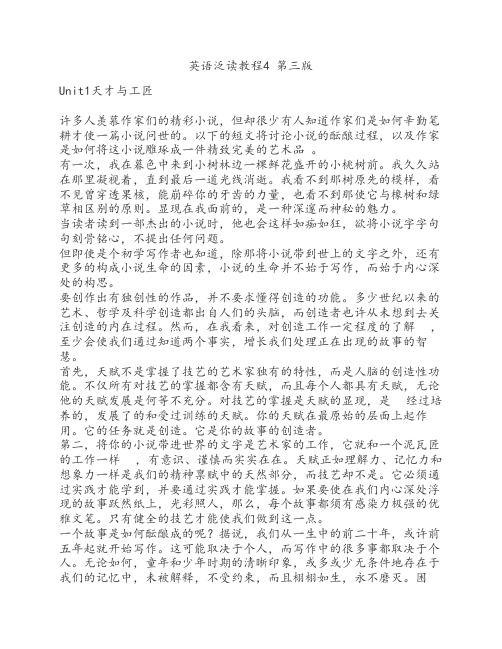
英语泛读教程4 第三版Unit1天才与工匠许多人羡慕作家们的精彩小说,但却很少有人知道作家们是如何辛勤笔耕才使一篇小说问世的。
以下的短文将讨论小说的酝酿过程,以及作家是如何将这小说雕琢成一件精致完美的艺术品 。
有一次,我在暮色中来到小树林边一棵鲜花盛开的小桃树前。
我久久站在那里凝视着,直到最后一道光线消逝。
我看不到那树原先的模样,看不见曾穿透果核,能崩碎你的牙齿的力量,也看不到那使它与橡树和绿草相区别的原则。
显现在我面前的,是一种深邃而神秘的魅力。
当读者读到一部杰出的小说时,他也会这样如痴如狂,欲将小说字字句句刻骨铭心,不提出任何问题。
但即使是个初学写作者也知道,除那将小说带到世上的文字之外,还有更多的构成小说生命的因素,小说的生命并不始于写作,而始于内心深处的构思。
要创作出有独创性的作品,并不要求懂得创造的功能。
多少世纪以来的艺术、哲学及科学创造都出自人们的头脑,而创造者也许从未想到去关注创造的内在过程。
然而,在我看来,对创造工作一定程度的了解 ,至少会使我们通过知道两个事实,增长我们处理正在出现的故事的智慧。
首先,天赋不是掌握了技艺的艺术家独有的特性,而是人脑的创造性功能。
不仅所有对技艺的掌握都含有天赋,而且每个人都具有天赋,无论他的天赋发展是何等不充分。
对技艺的掌握是天赋的显现,是 经过培养的,发展了的和受过训练的天赋。
你的天赋在最原始的层面上起作用。
它的任务就是创造。
它是你的故事的创造者。
第二,将你的小说带进世界的文字是艺术家的工作,它就和一个泥瓦匠的工作一样 ,有意识、谨慎而实实在在。
天赋正如理解力、记忆力和想象力一样是我们的精神禀赋中的天然部分,而技艺却不是。
它必须通过实践才能学到,并要通过实践才能掌握。
如果要使在我们内心深处浮现的故事跃然纸上,光彩照人,那么,每个故事都须有感染力极强的优雅文笔。
只有健全的技艺才能使我们做到这一点。
一个故事是如何酝酿成的呢?据说,我们从一生中的前二十年,或许前五年起就开始写作。
【刘乃银】英语泛读教程4第三版课文翻译

【刘乃银】英语泛读教程4第三版课文翻译【刘乃银】英语泛读教程4第三版课文翻译英语泛读教程4 第三版主编:刘乃银Unit1天才与工匠许多人羡慕作家们的精彩小说,但却很少有人知道作家们是如何辛勤笔耕才使一篇小说问世的。
以下的短文将讨论小说的酝酿过程,以及作家是如何将这小说雕琢成一件精致完美的艺术品。
有一次,我在暮色中来到小树林边一棵鲜花盛开的小桃树前。
我久久站在那里凝视着,直到最后一道光线消逝。
我看不到那树原先的模样,看不见曾穿透果核,能崩碎你的牙齿的力量,也看不到那使它与橡树和绿草相区别的原则。
显现在我面前的,是一种深邃而神秘的魅力。
当读者读到一部杰出的小说时,他也会这样如痴如狂,欲将小说字字句句刻骨铭心,不提出任何问题。
但即使是个初学写作者也知道,除那将小说带到世上的文字之外,还有更多的构成小说生命的因素,小说的生命并不始于写作,而始于内心深处的构思。
要创作出有独创性的作品,并不要求懂得创造的功能。
多少世纪以来的艺术、哲学及科学创造都出自人们的头脑,而创造者也许从未想到去关注创造的内在过程。
然而,在我看来,对创造工作一定程度的了解,至少会使我们通过知道两个事实,增长我们处理正在出现的故事的智慧。
首先,天赋不是掌握了技艺的艺术家独有的特性,而是人脑的创造性功能。
不仅所有对技艺的掌握都含有天赋,而且每个人都具有天赋,无论他的天赋发展是何等不充分。
对技艺的掌握是天赋的显现,是经过培养的,发展了的和受过训练的天赋。
你的天赋在最原始的层面上起作用。
它的任务就是创造。
它是你的故事的创造者。
第二,将你的小说带进世界的文字是艺术家的工作,它就和一个泥瓦匠的工作一样,有意识、谨慎而实实在在。
天赋正如理解力、记忆力和想象力一样是我们的精神禀赋中的天然部分,而技艺却不是。
它必须通过实践才能学到,并要通过实践才能掌握。
如果要使在我们内心深处浮现的故事跃然纸上,光彩照人,那么,每个故事都须有感染力极强的优雅文笔。
只有健全的技艺才能使我们做到这一点。
英语泛读教程4课文翻译之欧阳地创编

Unit1天才与工匠许多人羡慕作家们的精彩小说,但却很少有人知道作家们是如何辛勤笔耕才使一篇小说问世的。
以下的短文将讨论小说的酝酿过程,以及作家是如何将这小说雕琢成一件精致完美的艺术品。
有一次,我在暮色中来到小树林边一棵鲜花盛开的小桃树前。
我久久站在那里凝视着,直到最后一道光线消逝。
我看不到那树原先的模样,看不见曾穿透果核,能崩碎你的牙齿的力量,也看不到那使它与橡树和绿草相区别的原则。
显现在我面前的,是一种深邃而神秘的魅力。
当读者读到一部杰出的小说时,他也会这样如痴如狂,欲将小说字字句句刻骨铭心,不提出任何问题。
但即使是个初学写作者也知道,除那将小说带到世上的文字之外,还有更多的构成小说生命的因素,小说的生命并不始于写作,而始于内心深处的构思。
要创作出有独创性的作品,并不要求懂得创造的功能。
多少世纪以来的艺术、哲学及科学创造都出自人们的头脑,而创造者也许从未想到去关注创造的内在过程。
然而,在我看来,对创造工作一定程度的了解,至少会使我们通过知道两个事实,增长我们处理正在出现的故事的智慧。
首先,天赋不是掌握了技艺的艺术家独有的特性,而是人脑的创造性功能。
不仅所有对技艺的掌握都含有天赋,而且每个人都具有天赋,无论他的天赋发展是何等不充分。
对技艺的掌握是天赋的显现,是经过培养的,发展了的和受过训练的天赋。
你的天赋在最原始的层面上起作用。
它的任务就是创造。
它是你的故事的创造者。
第二,将你的小说带进世界的文字是艺术家的工作,它就和一个泥瓦匠的工作一样,有意识、谨慎而实实在在。
天赋正如理解力、记忆力和想象力一样是我们的精神禀赋中的天然部分,而技艺却不是。
它必须通过实践才能学到,并要通过实践才能掌握。
如果要使在我们内心深处浮现的故事跃然纸上,光彩照人,那么,每个故事都须有感染力极强的优雅文笔。
只有健全的技艺才能使我们做到这一点。
一个故事是如何酝酿成的呢?据说,我们从一生中的前二十年,或许前五年起就开始写作。
这可能取决于个人,而写作中的很多事都取决于个人。
英语泛读教程4unit-2-Three-Days-to-See课文和译文
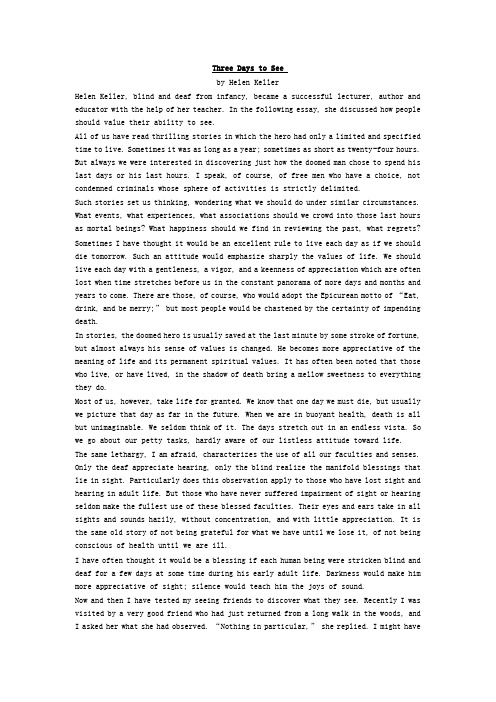
Three Days to Seeby Helen KellerHelen Keller, blind and deaf from infancy, became a successful lecturer, author and educator with the help of her teacher. In the following essay, she discussed how people should value their ability to see.All of us have read thrilling stories in which the hero had only a limited and specified time to live. Sometimes it was as long as a year; sometimes as short as twenty-four hours. But always we were interested in discovering just how the doomed man chose to spend his last days or his last hours. I speak, of course, of free men who have a choice, not condemned criminals whose sphere of activities is strictly delimited.Such stories set us thinking, wondering what we should do under similar circumstances. What events, what experiences, what associations should we crowd into those last hours as mortal beings? What happiness should we find in reviewing the past, what regrets? Sometimes I have thought it would be an excellent rule to live each day as if we should die tomorrow. Such an attitude would emphasize sharply the values of life. We should live each day with a gentleness, a vigor, and a keenness of appreciation which are often lost when time stretches before us in the constant panorama of more days and months and yea rs to come. There are those, of course, who would adopt the Epicurean motto of “Eat, drink, and be merry;” but most people would be chastened by the certainty of impending death.In stories, the doomed hero is usually saved at the last minute by some stroke of fortune, but almost always his sense of values is changed. He becomes more appreciative of the meaning of life and its permanent spiritual values. It has often been noted that those who live, or have lived, in the shadow of death bring a mellow sweetness to everything they do.Most of us, however, take life for granted. We know that one day we must die, but usually we picture that day as far in the future. When we are in buoyant health, death is all but unimaginable. We seldom think of it. The days stretch out in an endless vista. So we go about our petty tasks, hardly aware of our listless attitude toward life.The same lethargy, I am afraid, characterizes the use of all our faculties and senses. Only the deaf appreciate hearing, only the blind realize the manifold blessings that lie in sight. Particularly does this observation apply to those who have lost sight and hearing in adult life. But those who have never suffered impairment of sight or hearing seldom make the fullest use of these blessed faculties. Their eyes and ears take in all sights and sounds hazily, without concentration, and with little appreciation. It is the same old story of not being grateful for what we have until we lose it, of not being conscious of health until we are ill.I have often thought it would be a blessing if each human being were stricken blind and deaf for a few days at some time during his early adult life. Darkness would make him more appreciative of sight; silence would teach him the joys of sound.Now and then I have tested my seeing friends to discover what they see. Recently I was visited by a very good friend who had just returned from a long walk in the woods, and I asked her what she had observed. “Nothing in particular,” she replied. I might havebeen incredulous had I not been accustomed to such responses, for long ago I became convinced that the seeing see little.How was it possible, I asked myself, to walk for an hour through the woods and see nothing worthy of note? I who cannot see find hundreds of things to interest me through mere touch. I feel the delicate symmetry of a leaf. I pass my hands lovingly about the smooth skin of a silver birch, or the rough shaggy bark of a pine. In spring I touch the branches of trees hopefully in search of a bud, the first sign of awakening Nature after her winter's sleep. I feel the delightful, velvety texture of a flower, and discover its remarkable convolutions; and something of the miracle of Nature is revealed to me. Occasionally, if I am very fortunate, I place my hand gently on a small tree and feel the happy quiver of a bird in full song. I am delighted to have the cool water of a brook rush through my open fingers. To me a lush carpet of pine needles or spongy grass is more welcome than the most luxurious Persian rug. To me the pageant of seasons is a thrilling and unending drama, the action of which streams through my finger tips. At times my heart cries out with longing to see all these things. If I can get so much pleasure from mere touch, how much more beauty must be revealed by sight. Yet, those who have eyes apparently see little. The panorama of colour and action which fills the world is taken for granted. It is human, perhaps, to appreciate little that which we have and to long for that which we have not, but it is a great pity that in the world of light the gift of sight is used only as a mere convenience rather than as a means of adding fullness to life.If I were the president of a university I should establish a compulsory course in “How to Use Your Eyes”. The professor would try to show his pupils how they could add joy to their lives by really seeing what passes unnoticed before them. He would try to awake their dormant and sluggish faculties.Suppose you set your mind to work on the problem of how you would use your own eyes if you had only three more days to see. If with the oncoming darkness of the third night you knew that the sun would never rise for you again, how would you spend those three precious intervening days? What would you most want to let your gaze rest upon?I, naturally, should want most to see the things which have become dear to me through my years of darkness. You, too, would want to let your eyes rest long on the things that have become dear to you so that you could take the memory of them with you into the night that loomed before you.I should want to see the people whose kindness and gentleness and companionship have made my life worth living. First I should like to gaze long upon the face of my dear teacher, Mrs. Anne Sullivan Macy, who came to me when I was a child and opened the outer world to me. I should want not merely to see the outline of her face, so that I could cherish it in my memory, but to study that face and find in it the living evidence of the sympathetic tenderness and patience with which she accomplished the difficult tasks of my education. I should like to see in her eyes that strength of character which has enabled her to stand firm in the face of difficulties, and that compassion for all humanity which she has revealed to me so often.I do not know what it is to see into the heart of a friend through that “window of the soul”, the eye. I can only “see” through my finger tips the outline of a face. I can detect laughter, sorrow, and many other obvious emotions. I know my friends from the feel of their faces. But I cannot really picture their personalities by touch. I know their personalities, of course, through other means, through the thoughts they express to me, through whatever of their actions are revealed to me. But I am denied that deeper understanding of them which I am sure would come through sight of them through watching their reactions to various expressed thoughts and circumstances, through noting the immediate and fleeting reactions of their eyes and countenance.Friends who are near to me I know well, because through the months and years they reveal themselves to me in all their phases; but of causal friends I have only an incomplete impression, an impression gained from a handclasp, from spoken words which I take from their lips with my finger tips, or which they tap into the palm of my hand.How much easier, how much more satisfying it is for you who can see to grasp quickly the essential qualities of another person by watching the subtleties of expression, the quiver of a muscle, the flutter of a hand. But does it ever occur to you to use your sight to see into the inner nature of a friend or acquaintance? Do not most of you seeing people grasp casually the outward features of a face and let it go at that?For instance, can you describe accurately the faces of five good friends? Some of you can, but many cannot. As an experiment, I have questioned husbands of long standing about the color of their wives' eyes, and often they express embarrassed confusion and admit that they do not know. And, incidentally, it is a chronic complaint of wives that their husbands do not notice new dresses, new hats, and changes in household arrangements. The eyes of seeing persons soon become accustomed to the routine of their surroundings, and they actually see only the startling and spectacular. But even in viewing the most spectacular sights the eyes are lazy. Court records reveal every day how inaccurately “eyewitnesses” see. A given event will be “seen” in several different ways by as many witnesses. Some see more than others, but few see everything that is within the range of their vision.Oh, the things that I should see if I had the power of sight for just three days!(1634 words)译文假如我有三天光明海伦·凯勒海伦·凯勒自幼就又盲又聋,在老师的帮助下成为一名成功的讲师、作家及教育家。
英语泛读教程4unit2ThreeDaystoSee课文和译文之欧阳音创编
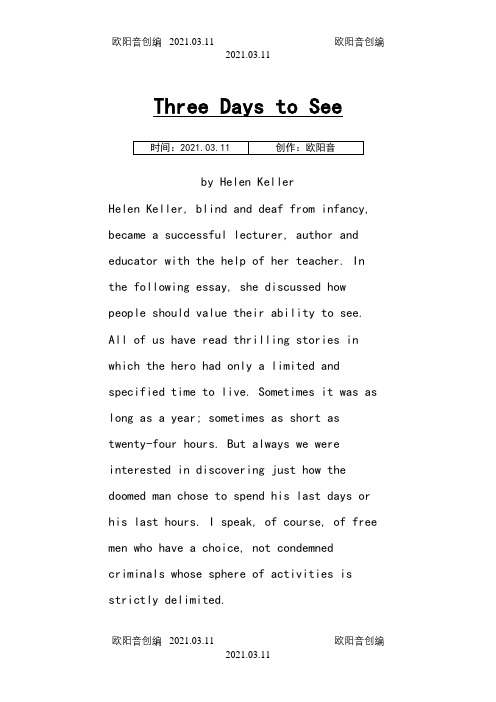
Three Days to Seeby Helen KellerHelen Keller, blind and deaf from infancy, became a successful lecturer, author and educator with the help of her teacher. In the following essay, she discussed how people should value their ability to see. All of us have read thrilling stories in which the hero had only a limited and specified time to live. Sometimes it was as long as a year; sometimes as short as twenty-four hours. But always we were interested in discovering just how the doomed man chose to spend his last days or his last hours. I speak, of course, of free men who have a choice, not condemned criminals whose sphere of activities is strictly delimited.Such stories set us thinking, wondering what we should do under similar circumstances. What events, what experiences, what associations should we crowd into those last hours as mortal beings? What happiness should we find in reviewing the past, what regrets?Sometimes I have thought it would be an excellent rule to live each day as if we should die tomorrow. Such an attitude would emphasize sharply the values of life. We should live each day with a gentleness, a vigor, and a keenness of appreciation which are often lost when time stretches before us in the constant panorama of more days and months and years to come. There are those, of course, who would adopt the Epicurean motto of “Eat, drink, and be merry;” but most people would be chastened by the certainty of impending death.In stories, the doomed hero is usually saved at the last minute by some stroke of fortune, but almost always his sense of values is changed. He becomes more appreciative of the meaning of life and its permanent spiritual values. It has often been noted that those who live, or have lived, in the shadow of death bring a mellow sweetness to everything they do.Most of us, however, take life for granted. We know that one day we must die, butusually we picture that day as far in the future. When we are in buoyant health, death is all but unimaginable. We seldom think of it. The days stretch out in an endless vista. So we go about our petty tasks, hardly aware of our listless attitude toward life.The same lethargy, I am afraid,characterizes the use of all our faculties and senses. Only the deaf appreciate hearing,only the blind realize the manifold blessings that lie in sight. Particularly does this observation apply to those who have lost sight and hearing in adult life. But those who have never suffered impairment of sight or hearing seldom make the fullest use of these blessed faculties. Their eyes and ears take in all sights and sounds hazily, without concentration, and withlittle appreciation. It is the same old story of not being grateful for what we have until we lose it, of not being conscious of health until we are ill.I have often thought it would be a blessing if each human being were stricken blind and deaf for a few days at some time during his early adult life. Darkness would make him more appreciative of sight; silence would teach him the joys of sound.Now and then I have tested my seeing friends to discover what they see. Recently I was visited by a very good friend who had just returned from a long walk in the woods, and I asked her what she had observed. “Nothing in particular,” she replied. I might have been incredulous had I not been accustomed to such responses, for long ago I became convinced that the seeing see little.How was it possible, I asked myself, to walk for an hour through the woods and see nothing worthy of note? I who cannot seefind hundreds of things to interest me through mere touch. I feel the delicate symmetry of a leaf. I pass my hands lovingly about the smooth skin of a silver birch, or the rough shaggy bark of a pine. In spring I touch the branches of trees hopefully in search of a bud, the first sign of awakening Nature after her winter's sleep. I feel thedelightful, velvety texture of a flower, and discover its remarkable convolutions; and something of the miracle of Nature is revealed to me. Occasionally, if I am very fortunate, I place my hand gently on a small tree and feel the happy quiver of a bird in full song. I am delighted to have the cool water of a brook rush through my open fingers. To me a lush carpet of pine needles or spongy grass is more welcome than the most luxurious Persian rug. To me the pageant of seasons is a thrilling and unending drama, the action of which streams through my finger tips.At times my heart cries out with longing to see all these things. If I can get so much pleasure from mere touch, how much more beauty must be revealed by sight. Yet, those who have eyes apparently see little. The panorama of colour and action which fillsthe world is taken for granted. It is human, perhaps, to appreciate little that which we have and to long for that which we have not, but it is a great pity that in the world of light the gift of sight is used only as a mere convenience rather than as a means of adding fullness to life.If I were the president of a university I should establish a compulsory course in “How to Use Your Eyes”. The professor would try to show his pupils how they could add joy to their lives by really seeing what passes unnoticed before them. He would try to awake their dormant and sluggish faculties.Suppose you set your mind to work on the problem of how you would use your own eyesif you had only three more days to see. If with the oncoming darkness of the thirdnight you knew that the sun would never risefor you again, how would you spend those three precious intervening days? What would you most want to let your gaze rest upon?I, naturally, should want most to see the things which have become dear to me through my years of darkness. You, too, would want to let your eyes rest long on the thingsthat have become dear to you so that you could take the memory of them with you into the night that loomed before you.I should want to see the people whose kindness and gentleness and companionship have made my life worth living. First I should like to gaze long upon the face of my dear teacher, Mrs. Anne Sullivan Macy, who came to me when I was a child and opened the outer world to me. I should want not merely to see the outline of her face, so that I could cherish it in my memory, but to studythat face and find in it the living evidence of the sympathetic tenderness and patience with which she accomplished the difficult tasks of my education. I should like to seein her eyes that strength of character which has enabled her to stand firm in the face of difficulties, and that compassion for all humanity which she has revealed to me so often.I do not know what it is to see into theheart of a friend through that “window ofthe soul”, the eye. I can only “see” through my finger tips the outline of a face.I can detect laughter, sorrow, and manyother obvious emotions. I know my friends from the feel of their faces. But I cannot really picture their personalities by touch.I know their personalities, of course, through other means, through the thoughtsthey express to me, through whatever oftheir actions are revealed to me. But I am denied that deeper understanding of them which I am sure would come through sight of them through watching their reactions to various expressed thoughts and circumstances, through noting the immediate and fleeting reactions of their eyes and countenance. Friends who are near to me I know well, because through the months and years they reveal themselves to me in all their phases; but of causal friends I have only an incomplete impression, an impression gained from a handclasp, from spoken words which I take from their lips with my finger tips, or which they tap into the palm of my hand.How much easier, how much more satisfying it is for you who can see to grasp quickly the essential qualities of another person by watching the subtleties of expression, the quiver of a muscle, the flutter of a hand.But does it ever occur to you to use your sight to see into the inner nature of a friend or acquaintance? Do not most of you seeing people grasp casually the outward features of a face and let it go at that? For instance, can you describe accurately the faces of five good friends? Some of you can, but many cannot. As an experiment, I have questioned husbands of long standing about the color of their wives' eyes, and often they express embarrassed confusion and admit that they do not know. And, incidentally, it is a chronic complaint of wives that their husbands do not notice new dresses, new hats, and changes in household arrangements.The eyes of seeing persons soon become accustomed to the routine of their surroundings, and they actually see only the startling and spectacular. But even inviewing the most spectacular sights the eyes are lazy. Court records reveal every day how inaccurately “eyewitnesses” see. A given event will be “seen” in several different ways by as many witnesses. Some see more than others, but few see everything that is within the range of their vision.Oh, the things that I should see if I had the power of sight for just three days!(1634 words)译文假如我有三天光明海伦·凯勒海伦·凯勒自幼就又盲又聋,在老师的帮助下成为一名成功的讲师、作家及教育家。
英语泛读教程4课文翻译之欧阳音创编

Unit1天才与工匠许多人羡慕作家们的精彩小说,但却很少有人知道作家们是如何辛勤笔耕才使一篇小说问世的。
以下的短文将讨论小说的酝酿过程,以及作家是如何将这小说雕琢成一件精致完美的艺术品。
有一次,我在暮色中来到小树林边一棵鲜花盛开的小桃树前。
我久久站在那里凝视着,直到最后一道光线消逝。
我看不到那树原先的模样,看不见曾穿透果核,能崩碎你的牙齿的力量,也看不到那使它与橡树和绿草相区别的原则。
显现在我面前的,是一种深邃而神秘的魅力。
当读者读到一部杰出的小说时,他也会这样如痴如狂,欲将小说字字句句刻骨铭心,不提出任何问题。
但即使是个初学写作者也知道,除那将小说带到世上的文字之外,还有更多的构成小说生命的因素,小说的生命并不始于写作,而始于内心深处的构思。
要创作出有独创性的作品,并不要求懂得创造的功能。
多少世纪以来的艺术、哲学及科学创造都出自人们的头脑,而创造者也许从未想到去关注创造的内在过程。
然而,在我看来,对创造工作一定程度的了解,至少会使我们通过知道两个事实,增长我们处理正在出现的故事的智慧。
首先,天赋不是掌握了技艺的艺术家独有的特性,而是人脑的创造性功能。
不仅所有对技艺的掌握都含有天赋,而且每个人都具有天赋,无论他的天赋发展是何等不充分。
对技艺的掌握是天赋的显现,是经过培养的,发展了的和受过训练的天赋。
你的天赋在最原始的层面上起作用。
它的任务就是创造。
它是你的故事的创造者。
第二,将你的小说带进世界的文字是艺术家的工作,它就和一个泥瓦匠的工作一样,有意识、谨慎而实实在在。
天赋正如理解力、记忆力和想象力一样是我们的精神禀赋中的天然部分,而技艺却不是。
它必须通过实践才能学到,并要通过实践才能掌握。
如果要使在我们内心深处浮现的故事跃然纸上,光彩照人,那么,每个故事都须有感染力极强的优雅文笔。
只有健全的技艺才能使我们做到这一点。
一个故事是如何酝酿成的呢?据说,我们从一生中的前二十年,或许前五年起就开始写作。
这可能取决于个人,而写作中的很多事都取决于个人。
大学英语泛读第四册22课翻译Wasthereagoldenage

大学英语泛读第四册22课翻译Wasthereagoldenage第一篇:大学英语泛读第四册22课翻译Was there a golden ageA 英国许多现代教育评论家常提及本世纪初的黄金时代, 他们觉得那时候的水准高一些;他们提倡恢复传统的教学法, 声称传统教学法是成功的。
但在我们学校里是否曾有过黄金时代呢? 如果以下由权威人士提供的数据真实可信的话, 那么本世纪当然还未出现过黄金时代。
B......本世纪这个国家有好几百万个孩子从儿时起, 一直到14 岁都在一种体制下受到阅读、写作和计算的训练。
其最后结果是: 当他们十三四岁离开学校时, 他们既不能读, 也不能写,也不会运算。
C.....事实是, 水平中等的男女学生在离开学校时, 不能清晰、流利或准确地书写英语。
D......据说学生计算数字的准确程度未达到20 年前所达到的标准。
1925 年(教育委员会)E.....我们已有足够的证据证明中学生英语水平的低劣———我们面对着中学教育的严重失败。
F 如果从成人识字的人数比例来看, 会发现同样的情况。
1945年西里尔·伯特爵士发现, 这个国家有1.5% ~2% 的人到21 岁还是文盲, 15%~20%的人是半文盲。
G假设自实行大众教育体制以来, 对教育现状进行的每次调查表明, 教育标准中存在严重缺陷, 这似乎是合乎情理的。
他们的发现也许都是正确的。
对今天教育标准自鸣得意是愚蠢的, 但是如果妄自认为在全面教育制度和现代教学实行之前, 学校一切都完美无缺则是荒唐的。
值得记住的是, 正是在二次世界大战期间对教学法的不满, 才导致了对待孩子和教学法的不同手段。
H 对11 岁以上孩子进行考试的普遍谴责, 是导致教学法改变的另一个原因。
11 岁时进行选拔制的弊端在别处已得到充分证实。
很清楚, 许多孩子没有得到公正的安排, 学生们的表现往往与人们对他们的期望不相上下, 因此考试结果便成了自我实现的预言, 这不足为奇。
英语泛读教程4__课文翻译
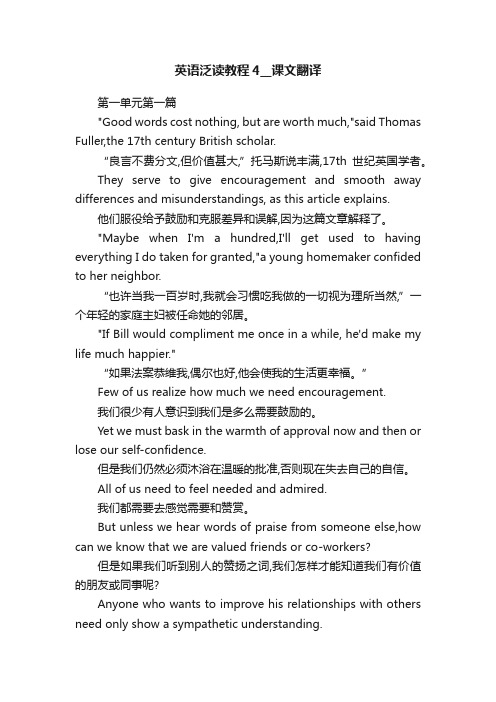
英语泛读教程4__课文翻译第一单元第一篇"Good words cost nothing, but are worth much,"said Thomas Fuller,the 17th century British scholar.“良言不费分文,但价值甚大,”托马斯说丰满,17th世纪英国学者。
They serve to give encouragement and smooth away differences and misunderstandings, as this article explains.他们服役给予鼓励和克服差异和误解,因为这篇文章解释了。
"Maybe when I'm a hundred,I'll get used to having everything I do taken for granted,"a young homemaker confided to her neighbor.“也许当我一百岁时,我就会习惯吃我做的一切视为理所当然,”一个年轻的家庭主妇被任命她的邻居。
"If Bill would compliment me once in a while, he'd make my life much happier."“如果法案恭维我,偶尔也好,他会使我的生活更幸福。
”Few of us realize how much we need encouragement.我们很少有人意识到我们是多么需要鼓励的。
Yet we must bask in the warmth of approval now and then or lose our self-confidence.但是我们仍然必须沐浴在温暖的批准,否则现在失去自己的自信。
All of us need to feel needed and admired.我们都需要去感觉需要和赞赏。
- 1、下载文档前请自行甄别文档内容的完整性,平台不提供额外的编辑、内容补充、找答案等附加服务。
- 2、"仅部分预览"的文档,不可在线预览部分如存在完整性等问题,可反馈申请退款(可完整预览的文档不适用该条件!)。
- 3、如文档侵犯您的权益,请联系客服反馈,我们会尽快为您处理(人工客服工作时间:9:00-18:30)。
英语专业泛读教程第四册课文翻译[宝典] 英语专业泛读教程第四册课文翻译英语专业泛读教程第四册课文翻译课文一天才与工匠许多人羡慕作家们的精彩小说,但却很少有人知道作家们是如何辛勤笔耕才使一篇小说问世的。
以下的短文将讨论小说的酝酿过程,以及作家是如何将这小说雕琢成一件精致完美的艺术品。
有一次,我在暮色中来到小树林边一棵鲜花盛开的小桃树前。
我久久站在那里凝视着,直到最后一道光线消逝。
我看不到那树原先的模样,看不见曾穿透果核,能崩碎你的牙齿的力量,也看不到那使它与橡树和绿草相区别的原则。
显现在我面前的,是一种深邃而神秘的魅力。
当读者读到一部杰出的小说时,他也会这样如痴如狂,欲将小说字字句句刻骨铭心,不提出任何问题。
但即使是个初学写作者也知道,除那将小说带到世上的文字之外,还有更多的构成小说生命的因素,小说的生命并不始于写作,而始于内心深处的构思。
要创作出有独创性的作品,并不要求懂得创造的功能。
多少世纪以来的艺术、哲学及科学创造都出自人们的头脑,而创造者也许从未想到去关注创造的内在过程。
然而,在我看来,对创造工作一定程度的了解,至少会使我们通过知道两个事实,增长我们处理正在出现的故事的智慧。
首先,天赋不是掌握了技艺的艺术家独有的特性,而是人脑的创造性功能。
不仅所有对技艺的掌握都含有天赋,而且每个人都具有天赋,无论他的天赋发展是何等不充分。
对技艺的掌握是天赋的显现,是经过培养的,发展了的和受过训练的天赋。
你的天赋在最原始的层面上起作用。
它的任务就是创造。
它是你的故事的创造者。
第二,将你的小说带进世界的文字是艺术家的工作,它就和一个泥瓦匠的工作一样,有意识、谨慎而实实在在。
天赋正如理解力、记忆力和想象力一样是我们的精神禀赋中的天然部分,而技艺却不是。
它必须通过实践才能学到,并要通过实践才能掌握。
如果要使在我们内心深处浮现的故事跃然纸上,光彩照人,那么,每个故事都须有感染力极强的优雅文笔。
只有健全的技艺才能使我们做到这一点。
一个故事是如何酝酿成的呢,据说,我们从一生中的前二十年,或许前五年起就开始写作。
这可能取决于个人,而写作中的很多事都取决于个人。
无论如何,童年和少年时期的清晰印象,或多或少无条件地存在于我们的记忆中,未被解释,不受约束,而且栩栩如生,永不磨灭。
困惑、徬徨、畏惧、喜悦、辉煌和平庸,在各种程度上以各种形式组合在一起。
这些对往事的印象在心中悸动着。
它们在等待什么,是在等待某种圆满的结果,还是对它们特有的真理的认可,似乎它们的创伤需要切开,隐秘的见解需要表露,发现需要与人分享,苦恼需要承认,这种飘渺的美需要形式。
我们就这样背负着各种任务渡过一生。
时而,一个常常是小小的体验,撬开了记忆之门,抓住了这些虽已年代久远,却依然栩栩如生,呼之欲出的印象。
于是,故事就如种子一般开始萌动。
这种经历人人都有,却鲜为人知。
然而,一旦富有创造力的作家有了这种感受,他就会凝神屏息,专注于此,因为他知道这时故事的种子已经萌发并开始了它自己的生命过程。
就象任何一颗种子,故事的种子有它自己的生长规律,要要经过作家对记忆中的素材进行精心筛选,从潜意识博大精深的阅历宝库中提取故事赖以实现其内在形式的素材。
于是,各种人物,他们的处世风格、气候、时间、地点及各种事物的精髓,都聚集起来。
简而言之,一个世界产生了,有灿烂的星辰,也有形形色色的障碍。
故事就是这样在“隐秘中构思,在思想土壤的最深处神秘地形成,”并不断地缓缓扩展、生长,直到它最终在意识中显现。
就在这意识的门槛上,故事带着希冀的颤栗等待它的文字整体的形成。
天赋创造的功能现已完成了它的使命。
只是到这时,工匠,这位故事的助产士才开始他的工作。
故事完整地呈现,即使有这样的情况,也是罕见的。
罗伯特?弗洛斯特说过,他开始作诗时从不知道这诗最终会是什么样。
而我往往在小说的第一稿几乎完成时才恍然大悟,意识到小说该怎样结尾,或它的中心思想是什么。
有时甚至在写完第二、第三稿,甚至更多稿之后小说才呈现出清晰的轮廓。
多年以前,十月的一个凌晨时分,我遥望小小的人造卫星划出一道弧线匆匆掠过星空。
又过了一段时间,我心中一直萌动的故事呈现出来:一位老人一生在都市中心过着寂寞生活,隐居到一个小海湾边的房子里。
他为那地方的美景和邻人的善良而激动不已,开始感受到那些生活道路将要走尽,由于某种原因从未付出或从未与人分享过任何东西的人们的绝望。
尽管当时心里朦朦胧胧仅有这点感受,我立刻着手第一稿,写道:“波米洛依湾的人们将蓝天奉献给了帕拉蒂先生。
他们将这一切全给了他,每个黎明,一片片雷雨云、一群群飞翔的野鹅和冉冉升起的红色月亮。
”当时我在干什么,我在描绘一个奇怪的才能:而且还有更多奇怪的才能。
接着我升上高空;尔后飞向运行中的万千星辰。
当我写到小说的结尾时,我不禁感到诧异,我开始写第一段时居然对整个小说毫无了解:每一个字都指出方向。
然而,我浑然不知时,我为什么动笔写作,我在干什么,我是在实施工匠的三个功能中的两个:信赖,第二:写作。
不论我的小说会是什么样,我坚信小说的灵性,它的真实性;不论它可能在何时显现,我都坚信它的完整性和它的形式。
在写作中我听任它发展,迎候它的显现。
我在为它的显现提供载体,否则它又怎能显现呢,信赖你的天赋吧,它是你的创造性功能,它的任务就是创造。
因为它在最原始的层面上起作用,因此,它所创造的小说是独一无二的。
这故事完全是你自己的。
没其他人能了解它,也没人能写出它。
这就是一个小说的价值,唯一的价值。
尊重你的创造性功能,依靠它获得智慧:它不是盲目冲动的产物,而是工作的原则。
信赖它,为它感到欣喜,运用它。
这正是培养天赋的奥秘所在,也是真正能力的开端。
信赖并着手写作。
当你开始感到小说急不可待的脉动时,就动笔写作。
如果你对它并不完全了解,就尽你所知去写。
逐个地写你所知道的那部分,要有耐心,不久你就会完全知道你所写的是什么。
假如你写得不好,那就尽你所能去写。
务必竭尽全力,以你当时所能驾驭的全部智慧努力写得明白清晰。
如果能这样做并坚持不懈,你一定能稳步提高。
因为认真踏实的工作可以真正发展智力。
不懈的实践可以真正形成技能,而形成技能就是工匠的第三个任务。
以你最好的文笔尽你所能写每一个故事,每一封信,如果你写日记的话,要这样在日记中记每一件事。
要写好。
要写得有技巧。
要写得优雅,如果你能够的话,要写得完美。
对任何成文的材料都应力求谨慎、真实。
任何低于当时你所能达到的完美程度的文字都谈不上是技艺,而是浅尝輒止的儿戏。
初事写作者总是力图尽量快捷、高效地找到适合他的写作方法,以求省时省力。
谈起方法,我们都知道写作不是教会的,而是学会的。
但是常识——天赋的狡诘的侍女却告诉我们,实际从事写作者象日复一日干着同一工作的管子工、从政者和金银首饰匠一样,谈起他们的工作都很在行。
读作家们所写的书,听作家们所说的话,你就可以发现他们的工作习惯中有许多与自己相同的偏爱和冲动。
你会发现这些不仅是你自己独有的癖好,而往往是从事写作者的性情中特有的,极其重要的几种癖性。
它们对你有利,可以为你所用。
我每天写作四小时,一连写了十年之后,才发表作品。
在写作过程中,我没有老师指导,也没有写作的书籍可供参考。
我花了很长时间才发现了一种写作方法。
多年之后,一位十分优秀的教师说:“要知道,好小说不是写成的而是改成的。
”当时,我沉思着回答说:“是啊~我明白。
但愿早就有人告诉我。
”我处理小说的方法简单而行之有效。
当一个故事在我脑海中呈现出来,当我朦胧地感觉到它的显现,就迅速将它草拟成一个提纲。
不久,也许就在次日,我就通篇重写,这一次不可避免地会加进更多内容并填补很多缺漏。
我总是对小说进行整体处理。
每隔一段时间我就继续重写,再将其搁在一边冷一段时间,然后根据需要反复重写,直到文字流畅、妥贴。
我总是试图用词准确,贴切,就象将湿绸缎紧裹在身上那样,努力使文字简明练达。
目的是有魔力的。
当你以追求卓越为目的而写作时,无论你的工作如何艰辛,它绝不会单调乏味。
不论你的工作成果如何不如人意,只要你不愿裹足不前就绝不是失败。
以这种方式重写不是乏味的苦工而是技艺上的探索。
如果你将小说当作活生生、有灵性的整体来对待,修改就有活力,因为在此过程中有三件事同时发生:第一,你达到了对整个故事的完全了解。
你几乎不能相信,在写第一、第二稿时,你对这个故事的了解是何等不足,直到第四第五稿,你才能领悟到这一点。
它一层层地显示出来;起先不受关注的小事件渐渐变得重要;含混处变得清晰。
在反复阅读的过程中闪过眼前的事物向你跳跃,以引起注意。
对这个故事的彻底理解给了你控制力,而这种控制力使你能将故事写到最好。
因为你知道你在做什么。
彻底了解一个故事也为你了解下一个故事做好了充分的准备。
你在写它的第一稿时就不会再感到困惑或束手无策。
尽管还会有种种缺憾,内容模糊不清或行文粗劣,你仍可以认为这是你写的最好的东西。
你会自信地去修改,确信它会逐步完善,第二,你取得了一种其它任何练习、书籍乃至无论知识如何渊博的老师都所不能给你的技能。
在一次又一次解决情节问题、写作问题的过程中,你学会了如何高效地工作;你学习了新的方法,而最重要的是,你获得了自己的方法。
重读往往宽容写作中的错误,而重写则往往揭示出错误。
不自然地过分炫耀词藻,常常在重写时暴露无遗;你自认为机智含蓄的东西,往往是对难以表述的问题的故意回避。
而这些问题对于故事而言,恰恰是至关重要而务必清晰表述的。
你的判断力和敏感性,由于你被迫面对那一个个枯燥乏味的字眼和粗劣笨拙的段落而变得敏锐起来。
每改进一个句子、一个段落,你都在提高你的技能。
渐渐地,你会看到追求卓越并非空泛的梦想,而是一种可能。
第三,修改是修改,作家的工作是写作。
阅读、听课、与专事写作的作家们交谈都是极为有益的,但它们只在你致力于写作时才有帮助。
修改为脚踏实地的写作指明了目标,而这一目标会给予你终身受益的回报,即不断提高的技能。
修改有助于形成习惯,而世上再也没有比工作的习惯更能激发才智的了。
绝不要强加给你的能力任何限制,也绝不允许任何人这样做。
一旦力求完美成为你的习惯,你就会领悟到杰作并不神秘,也绝非偶然,而是一种生活方式的结果。
出人意料的人口变化马克斯?辛格世界人口会象人们通常认为的那样持续增长吗,造成人口变化的因素是什么,请阅读下面的文章,并弄清其观点。
现在起五十年后,世界人口将会减少,而且还看不到终止的迹象。
除非人们的价值观产生巨大变化,否则几个世纪后,生活在整个地球上的人口可能会比今天生活在美国的还要少。
过去二十年最令人吃惊的事情是,没有一个国家当其出生率降到人口置换率水平时——每个妇女生育2.1个子女——就停止下降了。
例如,在意大利,该比率已降到1.2。
整个西欧和日本降至1.5。
现在的证据显示大约五十年内世界人口将达到八十亿的顶点,然后将开始相当迅速地减少。
